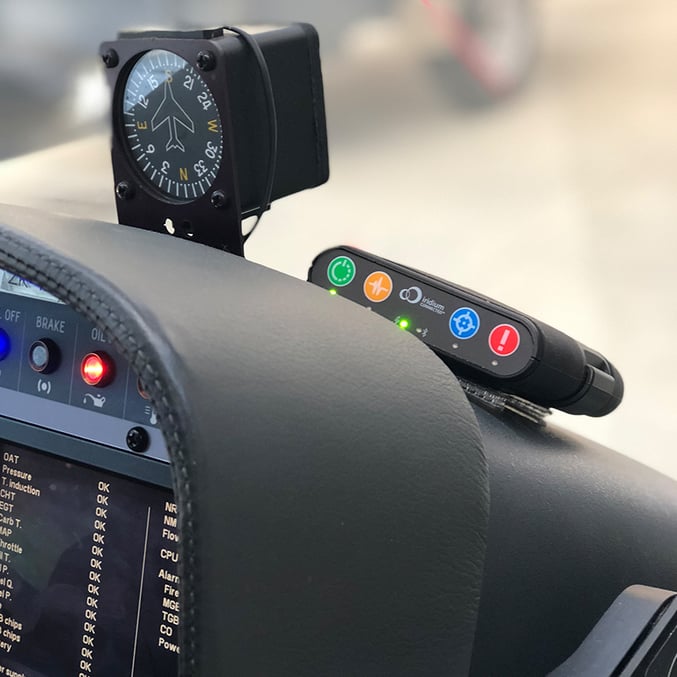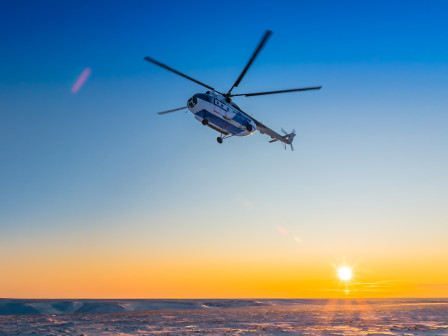Having an emergency GPS tracker for helicopters is essential for any fleet. Despite this fact, some pilots may not be aware of the vast potential of modern-day systems, or of the importance of timely maintenance of the device in order to ensure its dependability.
In this guide, we'll cover the benefits of GPS trackers for helicopters, as well as the different types available and how to choose the right one. We'll also discuss the installation process and how to use them, as well as potential problems that may arise with usage and maintenance tips.
- Benefits of Using GPS Trackers for Helicopters
- Different Types of GPS Trackers for Helicopters
- Factors to Consider When Choosing a GPS Tracker for Helicopters
- Installation Process for GPS Trackers on Helicopters
- How to Use a GPS Tracker for Helicopters
- Common Issues with GPS Trackers for Helicopters
- Tips for Maintaining Your GPS Tracker for Helicopters
1. Benefits of Using GPS Trackers for Helicopters
A GPS tracker for helicopters is an invaluable tool for pilots and owners alike. Not only do these give an advantage when it comes to locating a helicopter quickly in an emergency, but they also provide useful information about trends such as engine performance, fuel efficiency and flight pattern data. Trackers also can reduce time spent in the air as they help pilots choose routes that are both efficient and safe.
Monitoring a helicopter via a GPS tracker can help fleets of any size effectively manage their aircraft. The device’s real-time data can be used to assess the performance of the helicopter to make sure it meets the safety and efficiency standards set by the organization. Additionally, it can be used to keep a close eye on maintenance schedules and ensure that they are being followed as they should.
GPS trackers can also be used to monitor the location of a helicopter at all times. This can be especially useful for helicopters that are used for long-distance flights, as it can help ensure that the aircraft is always on the right path and that it is not straying too far from its intended destination. This can help reduce the risk of accidents and ensure that the helicopter is always in the right place at the right time.

2. Different Types of GPS Trackers for Helicopters
GPS tracking systems come in a variety of shapes, sizes, and capabilities and are specifically designed to meet different needs. Some trackers are suitable for professional use, while others are more appropriate for recreational activities. It is important to consider the use case before deciding on a particular model.
The most basic type of GPS tracker for helicopters is a tracking tag that transmit location data back to the provider’s server. A tag is simple and easy to install; however, its range is limited and it lacks extensive features. More advanced systems offer greater capabilities, such as providing detailed flight path analysis and allowing for more efficient route planning.
For professional use, a more sophisticated GPS tracker is recommended. These trackers are typically more expensive, but they offer a range of features such as real-time tracking, two-way communications, and automated alerts. They also provide more detailed data, such as altitude, speed, and heading, which can be used to improve safety and efficiency.
3. Factors to Consider When Choosing a GPS Tracker for Helicopters
When selecting a GPS tracker for a helicopter, it is important to weigh various factors. These include coverage, accuracy, features, size, and cost. Coverage defines the geographical area the device can monitor. Accuracy refers to how accurately the device can determine a location in relation to landmarks like roads or other built structures. Features such as dual cell/sat connectivity or automated alerts may be important depending on the circumstances. Size should also be considered in terms of weight and area to be placed on the helicopter dash.
The cost of GPS tracking systems for helicopters can range from very inexpensive consumer-grade devices all the way up to military-grade systems. It is important to remember that military-grade systems are not necessary for most civilian applications and may be too costly or powerful for an individual’s needs.
When selecting a GPS tracker for a helicopter, it is also important to consider the type of tracking technology used. Different types of tracking technology, such as cellular, satellite, or radio frequency, can have different levels of accuracy and coverage. Additionally, the type of tracking technology used can affect the cost of the device.
4. Installation Process for GPS Trackers on Helicopters
Installing a GPS tracker onto a helicopter can be a complex task requiring professional expertise if attempting any work on or near electrical systems or components. Most systems require compatible wiring schematics, secure antenna placement, and checking installation standards. Additionally, if applicable, routing and installation gaps must be properly sealed off to prevent moisture or dust from entering sensitive parts of the helicopter.
It is important to ensure that the GPS tracker is properly connected to the helicopter's power source. This can be done by connecting the tracker to the aircraft's battery or to the aircraft's electrical system. Additionally, the tracker should be tested to ensure that it is functioning correctly and that all connections are secure. Finally, the tracker should be calibrated to the aircraft's navigation system to ensure accurate tracking.
5. How to Use a GPS Tracker for Helicopters
Once installed, using a GPS tracker for helicopters is simple. The device can be accessed from computers or tablets through a web interface and data can be quickly retrieved regarding current flight paths or historic routes. It also allows for information about maintenance routines and fuel efficiency.
The GPS tracker also allows for real-time tracking of the aircraft, which can be used to monitor the progress of a flight and ensure that it is following the correct route. This can be especially useful for long-distance flights, as it allows for quick and easy monitoring of the aircraft's progress.
6. Common Issues with GPS Trackers for Helicopters
GPS trackers are reliable devices but they can suffer from a range of problems including inadequate coverage due to poor antenna placement or incompatibility with existing components on-board the helicopter. It is important to check installation diagrams prior to fixing any component as mistakes may render the device inoperable.
GPS trackers may also lose their connection with satellites if they are being flown into built-up areas where radio interference upsets communications. Fortunately, this typically only affects accuracy rather than total connection loss.
In addition, GPS trackers can be affected by extreme weather conditions such as heavy rain or snow, which can interfere with the signal. It is important to check the tracker regularly to ensure it is functioning correctly and to replace any components that may have been damaged by the weather.
7. Tips for Maintaining Your GPS Tracker for Helicopters
The life expectancy of a well-maintained GPS tracker will be increased significantly if regular care is taken whilst using it. Before each mission, it is important to check if everything is functioning correctly, by testing the accuracy of its readings by visiting known coordinates. Doing so ensures that any drift has not occurred after long periods in storage.
As well as calibration tests, it is advisable to check that all fixtures remain secure when your aircraft executes maneuvers and that all wires have not become loose over time. Doing so helps maintain peak performance from your tracking devices.
Conclusion
GPS trackers for helicopters provide a wealth of benefits for pilots and owners alike. From tracking accuracy to maintenance management, these systems are incredibly valuable for keeping aircraft safe and efficient. When choosing one, it is important to consider coverage, accuracy, and features in order to find a system that best serves your needs. Installation can be complex and should only be performed with comprehensive support, or installed by professionals when possible.
If you’re interested in learning more about the specific helicopter GPS trackers we can provide for your operations, let’s have a chat.
